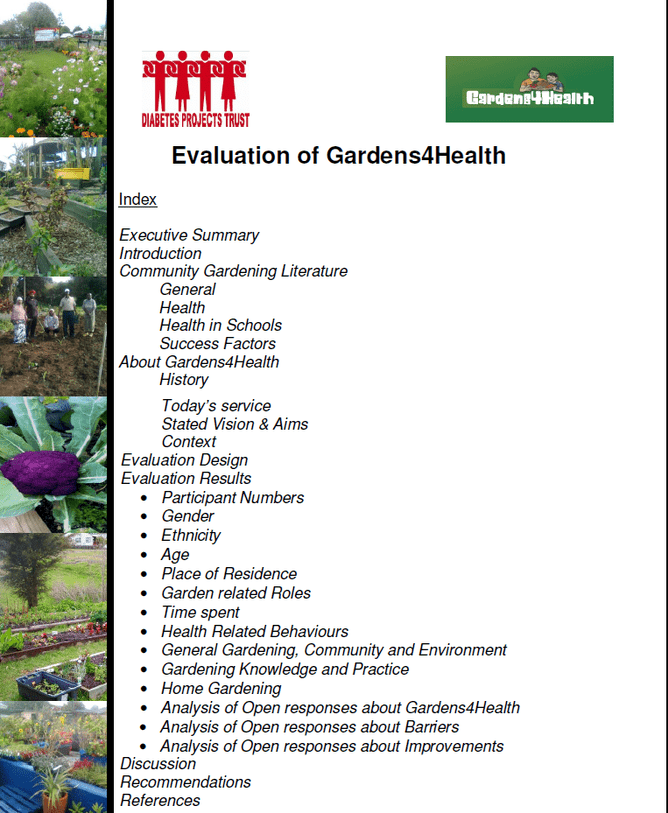The Gardens4Health programme was started in 2008 as a community pilot called 'gardening for health and sustainability'. This was under the auspices of the Counties Manukau District Health Board as part of the Lets Beat Diabetes programme. In 2009 the programme came under the umbrella of Diabetes Projects Trust where it was re-developed for wider rollout and sustainability.
An evaluation was commissioned in 2011 as part of the routine contract for service delivery for the Gardens4Health programme. The objective of this evaluation was gaining a greater understanding around what does and doesn’t work in relation to delivery of the community gardening programme Gardens4Health. Also required was the examination of evidence around community gardens in general as a way of impacting on the health of at risk community members. The direction was for a mixed methods evaluation to include process and impact, describe the activity itself, its effect and effectiveness.
Gardening to produce vegetables and fruit is a legitimate tool to help improve the health of a population, and the ‘community gardening’ approach can bring gardening back into the reach of people who may not be resourced, have the appropriate knowledge, wherewithal or facilities to garden at home. Research suggests that gardening is potentially an effective instrument which can be used to increase consumption of fruit and vegetables and increase physical activity, both potent tools against obesity and related disorders such as diabetes, cardiovascular disease, and some forms of cancer. Other literature describes the community gardening approach as likely to achieve multiple health benefits in a relatively efficient manner, as well as having social, financial, and environmental gains.
The Gardens4Health approach of supporting others to take responsibility themselves, has seen an exponential increase in the number of gardens across Auckland, and the team provides continuing input into these gardens as needed to ensure their sustainability. That demand seems set to continue as more are encouraged and supported to fund, set-up and run their community gardens.
From the evaluation results, Gardens4Health would appear to be delivering a valued service which is felt to be beneficial at a range of levels by those participating. The programme has broad reach across Auckland and is able to facilitate the networking of gardens and sharing of information, as well as contribute to the wider picture through presenting what has been learned at public venues, submitting to local body planning, and keeping in touch with District Health Boards.
Recommendations for the future include looking in more detail at key areas of interest raised from this evaluation such as sourcing longer term funding to keep the programme viable and maximize efficiencies. Investigation into where changes can be made to such areas as transport, supplier network, leadership pathways, and better linkage with providers who can teach about what to do with produce are also of potential value. The full report can be downloaded from the link below.
For more information on the Gardens4Health community gardens service please contact gardens4health@diabetesfoundationaotearoa.nz or call 09 273 9650


